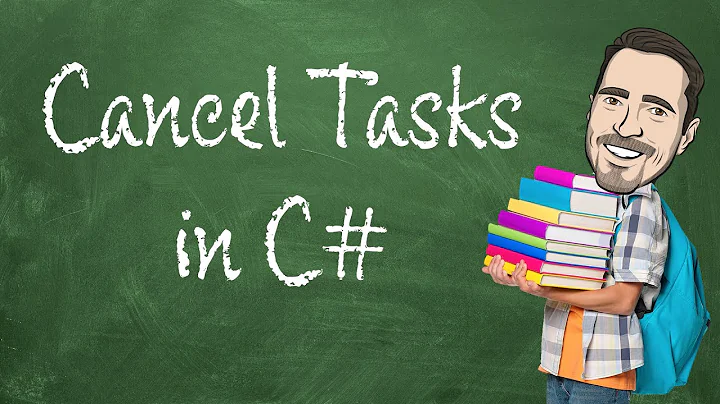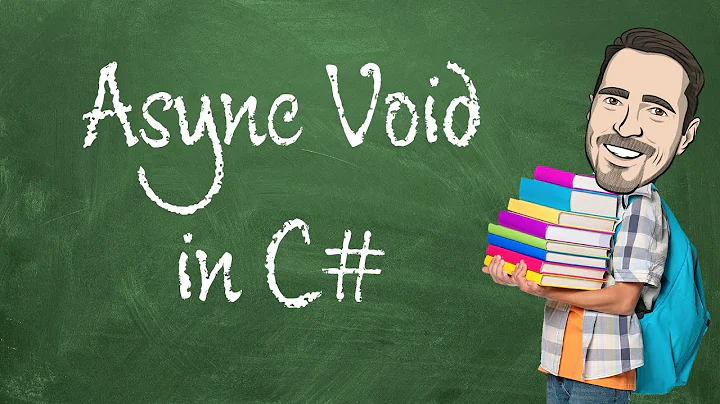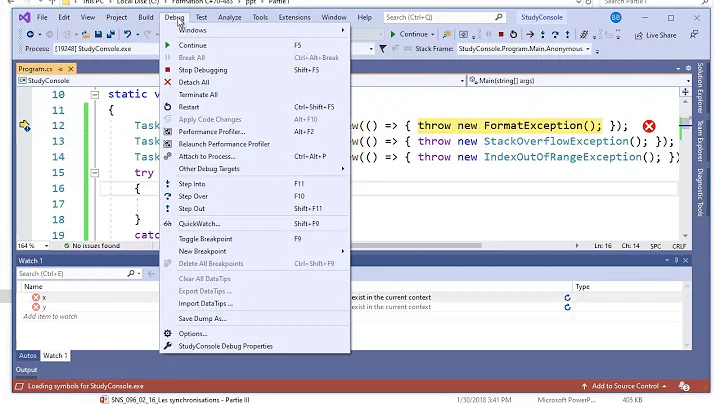Is catching TaskCanceledException and checking Task.Canceled a good idea?
In the .Net framework itself when you pass a CancellationToken as a parameter you will get back a TaskCanceledException. I would not go against that and create my own design pattern because people who are familiar with .Net will be familiar with your code.
My guideline is this: The one that cancels the token is the one that should handle the TaskCanceledException, so If you're using a CancellationToken inside your method for your own reasons, go ahead and use a try-catch block. But if you get the token as a parameter, let the exception be thrown.
Related videos on Youtube
Tim Lovell-Smith
Updated on January 12, 2020Comments
-
Tim Lovell-Smith over 4 years
There are some people on my team who really love coding with async
Task. And sometimes they like to useCancellationTokenparameters.What I'm unsure about is whether we should as a team be using this style of code (A):
async Task<someObject> DoStuff(CancellationToken t) { while (!t.IsCanceled) { try { Task.Delay(5000, t); } catch (AggregateException e) // or is it TaskCanceledException or OperationCanceledException? I don't know? :) { } // poll something, return someObject, or null } return null; }This obviously means the caller probably has to check the cancellation token themselves to determine whether to continue processing, and they might have to handle null retVals:
var retVal = await DoStuff(token); if (token.IsCanceled) { ... }However, if we adopt a second style of code (B) that relies on TaskCanceledException:
async Task<someObject> DoStuff(CancellationToken t) { while(true) { Task.Delay(5000, t); // poll something, return someObject, or null } }The implementation code is definitely simpler - and the caller has the option of handling the exception or not, as appropriate... but I can't help worrying that callers might forget that TaskCanceledException is something they have to worry about, and processes may crash as a result of them not catching these exceptions (on foreground or background threads).
So, my overly optimistically phrased question is: which do you think is the best style that everyone should always use, and why? :)
-
 clarkitect almost 10 yearsI'm interested in the answer(s) to this, and I have my own as well, but I suspect this question is soliciting opinion which is not exactly considered on-topic for SO. Have you considered requesting moderator assistance in moving this to codereview instead?
clarkitect almost 10 yearsI'm interested in the answer(s) to this, and I have my own as well, but I suspect this question is soliciting opinion which is not exactly considered on-topic for SO. Have you considered requesting moderator assistance in moving this to codereview instead? -
Tim Lovell-Smith almost 10 yearsI think opinion is totally on-topic for SO in the case of 'what in your opinion is good programming practice'.
-
Tim Lovell-Smith almost 10 yearsI also do not consider this a code review question as it's targeted at a particular topic, it's not 'tell me how to code this bettr'.
-
 clarkitect almost 10 yearsI didn't feel that strongly about it; it just looked similar to subjective question(s) that have been flagged in the past. I'm glad it's getting good discussion :)
clarkitect almost 10 yearsI didn't feel that strongly about it; it just looked similar to subjective question(s) that have been flagged in the past. I'm glad it's getting good discussion :) -
 noseratio almost 10 years@TimLovell-Smith, you should never swallow
noseratio almost 10 years@TimLovell-Smith, you should never swallowAggregateExceptionlike in your code, without inspecting inner exceptions. Also, it can be eitherOperationCanceledExceptionorTaskCanceledException. Check this document: Using Cancellation Support in .NET 4.0.
-
-
Tim Lovell-Smith almost 10 yearsGreat answer for including a coding guideline for ensuring that exceptions get handled!
-
Ricibob over 8 yearsGood answer - but would be nice to see some code examples in the same vein as the org question.
-
Corio over 5 yearsAlso, it's generally a good practice to catch
OperationCanceledExceptionas stated in the "Recommended patterns for CancellationToken" article ("Handling cancellation exceptions" section).






